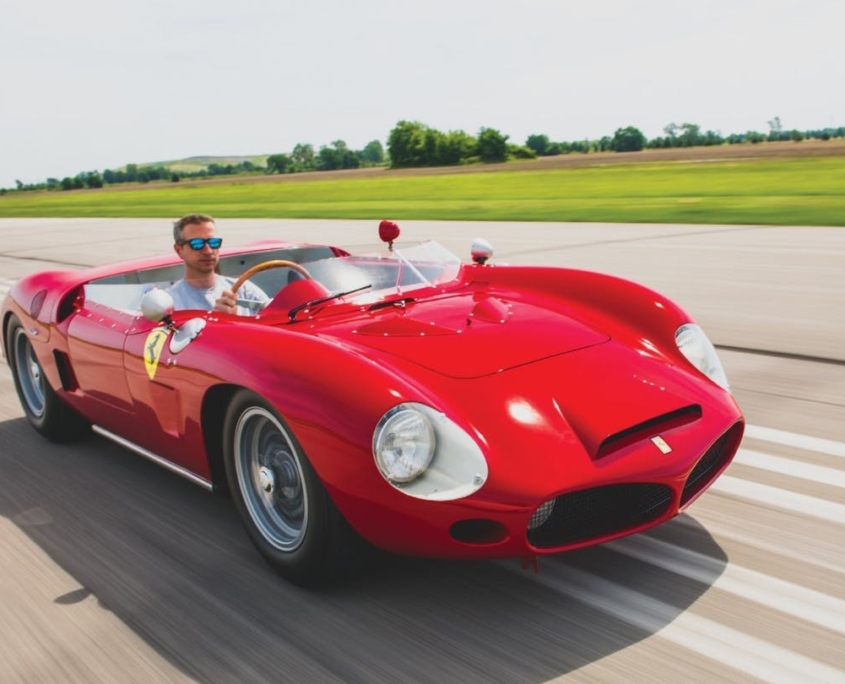1962 Ferrari 196 SP
The new 1960’s sports models included the 196 SP which did not have a Dino engine, but was effectively a half of the 330’s V12 engine, from which it retained the bore and stroke. The 196 SP boasted the twin front air intakes first introduced on the single-seaters in 1961.
The Ferrari 196 SP was introduced in 1962 as a successor to the Ferrari 246 SP. It was designed specifically for competition in the Sports Prototype class, which was popular during that era.
Engine and Performance
The 196 SP was powered by a 2.0-liter V6 engine, which was derived from the Dino V6 engine family. It produced around 210 horsepower, allowing the car to reach a top speed of approximately 160 mph (260 km/h). The engine was mated to a 5-speed manual gearbox.
Design and Construction
The 196 SP featured a lightweight and aerodynamic design, with a tubular steel chassis and a fiberglass body. It incorporated various racing technologies of the time, such as independent suspension, disc brakes, and a rear-mounted transaxle for improved weight distribution.
Racing Success-
The Ferrari 196 SP achieved notable success on the racing circuit. In 1962, it made its debut at the Targa Florio race in Sicily, where it finished first in its class and third overall. It also competed in other prestigious events such as the 24 Hours of Le Mans and the 12 Hours of Sebring, achieving respectable results.
Production-
Ferrari produced a limited number of 196 SP cars. Reports suggest that only six examples were built, making it a rare and sought-after model among collectors and enthusiasts.
Legacy-
The Ferrari 196 SP played a significant role in Ferrari’s racing heritage during the early 1960s. Its racing successes helped solidify Ferrari’s reputation as a dominant force in sports car racing. Today, surviving examples of the 196 SP are highly valued and cherished by collectors due to their historical significance and rarity.
Ferrari 196 SP Technical Specifications
Year of Manufacture – 1962
| ENGINE | ||
| type | rear, longitudinal 60° V6 | |
| bore/stroke | 77 x 71 mm | |
| unitary displacement | 330.62 cc | |
| total displacement | 1983.72 cc | |
| compression ratio | 9.8 : 1 | |
| maximum power | 154 kW (210 hp) at 7500 rpm | |
| power per litre | 106 hp/l | |
| maximum torque | – | |
| valve actuation | single overhead camshafts per bank, two valves per cylinder | |
| fuel feed | three Weber 42 DCN carburettors | |
| ignition | single spark plugs per cylinder, two coils | |
| lubrication | dry sump | |
| clutch | multi-plate | |
| CHASSIS | ||
| frame | tubular steel | |
| front suspension | independent, unequal-length wishbones, coil springs, telescopic shock absorbers, anti-roll bar | |
| rear suspension | independent, unequal-length wishbones, coil springs, telescopic shock absorbers | |
| brakes | discs | |
| transmission | 5-speed + reverse | |
| steering | rack-and-pinion | |
| fuel tank | – | |
| front tyres | 5.25 x 15 | |
| rear tyres | 6.50 x 15 | |
| BODYWORK | ||
| type | two-seater spider | |
| length | 4060 mm | |
| width | 1480 mm | |
| height | 970 mm | |
| wheelbase | 2320 mm | |
| front track | 1200 mm | |
| rear track | 1200 mm | |
| weight | 600 kg (dry) | |
| PERFORMANCE | ||
| top speed | 240 km/h | |
| acceleration 0-100 km/h | – | |
| 0-400 m | – | |
| 0-1000 m | – | |

